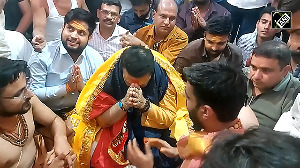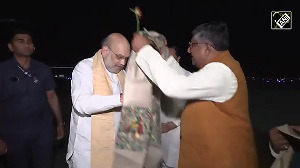 Recent media reports suggested that the Narendra Modi government at the Centre is seeking the removal of governors of states appointed by the previous Congress government. Subhash C Kashyap, former secretary-general of the Lok Sabha and a constitutional expert, speaks to Manavi Kapur on the predicament that several governors are now facing
Recent media reports suggested that the Narendra Modi government at the Centre is seeking the removal of governors of states appointed by the previous Congress government. Subhash C Kashyap, former secretary-general of the Lok Sabha and a constitutional expert, speaks to Manavi Kapur on the predicament that several governors are now facing
What is a governor's role?
A governor is the link between the Union and the state. He has to take care of the interests of the nation as a whole as against the interest of the state itself. If and when there is a conflict of interest, he must look after the interest of the whole union. For example, if there is a bill passed by the state legislature that is likely to adversely affect any other state or the nation as a whole, he is not supposed to sign the bill and instead, reserve it for the assent of the president.
It is a very important role and I do not agree with people who say that the governor's office has become redundant.
What are the problems that arise if a governor does not belong to the ruling party at the Centre?
A governor is not a representative of any party - he is a representative of the union in a state. This is why the president appoints the governor. The Opposition at the Centre could be the ruling party in a state of which he may be the governor. He is neither to be governed by the dictates of the majority party in the state or at the Centre.
If the union government has to send any directives, it can send those to the state government under Articles 256 and 257 in the Constitution.
About the current controversy, I want to say that there has been no official statement by a government representative. The reports are based on what one governor and the home secretary talked about and leaked to the media. Either the governor should have accepted the suggestion and gracefully resigned or asked for an official statement.
The dignity of a governor's office demands that the moment a union government does not want him, he must walk out. A governor never asks on what merit he is appointed, so why must he ask questions on being removed?
Both Congress-and Bharatiya Janata Party-led governments have made demands for the removal of governors appointed by other parties in the past. Are these constitutional? In light of the Supreme Court ruling in 2010, are they legally valid?
The Supreme Court ruling is being selectively quoted and in fact, misquoted. The Supreme Court is clear in the operative part of the judgement in 2010 that the union government or the president has powers to remove any governor.
The Constitution is very clear that a governor only holds office during the pleasure of the president. And the apex court said that courts will presume the bona fide of the president's action in removing a governor.
The second thing the Supreme Court said is that a governor who is removed has no right to demand that the grounds of his removal be conveyed to him. It states that there must be a reason for removing a governor on file.
But if the governor feels that the grounds for his removal are mala fide, then he has to make "a very strong case" before the court proving his removal is capricious and arbitrary.
The onus of making such a case is on the governor who has been removed and not on the government, and only in such "very strong cases" can the court intervene. There is very limited scope for judicial review in this matter.
Who is authorised to ask for the governor's removal? What is the process for a particular governor's removal if he/she refuses to resign on the ruling party's demands?
Only the president of India, who represents the Union of India, is authorised to ask for a governor's removal. The court also presumes that the president is acting on the advice of the council of ministers. According to the Supreme Court ruling, there can be no dispute on the point that the president has the powers to remove a governor.
The governor is a representative of the president of India. If the central government sends a request for the removal of a governor and the president sends it back, what happens then?
The president can return a recommendation to the council of ministers for reconsideration. But normally, the rule is that if the same recommendation is made twice, the president has no choice but to accept it. Suppose the prime minister advises a removal, the president is not bound to consider it unless it is in consultation with the cabinet.
This is laid down in the Constitution under the section that describes the president's powers. The case of President V V Giri's refusal to dissolve the House on the request of Indira Gandhi, who was then the prime minister, is a case in point. Gandhi was asked to first table the matter before the cabinet and only then approach the president.







 © 2025
© 2025